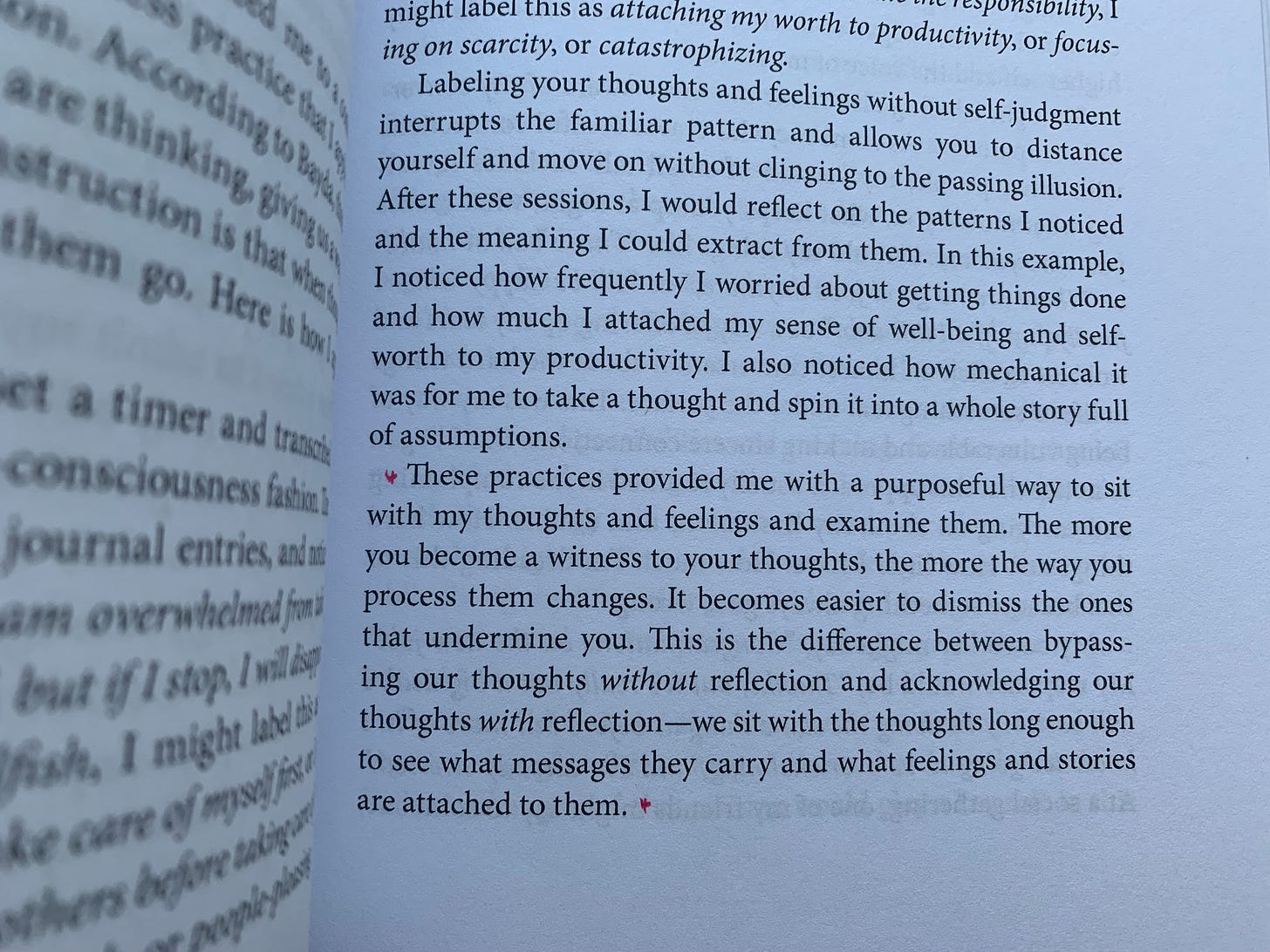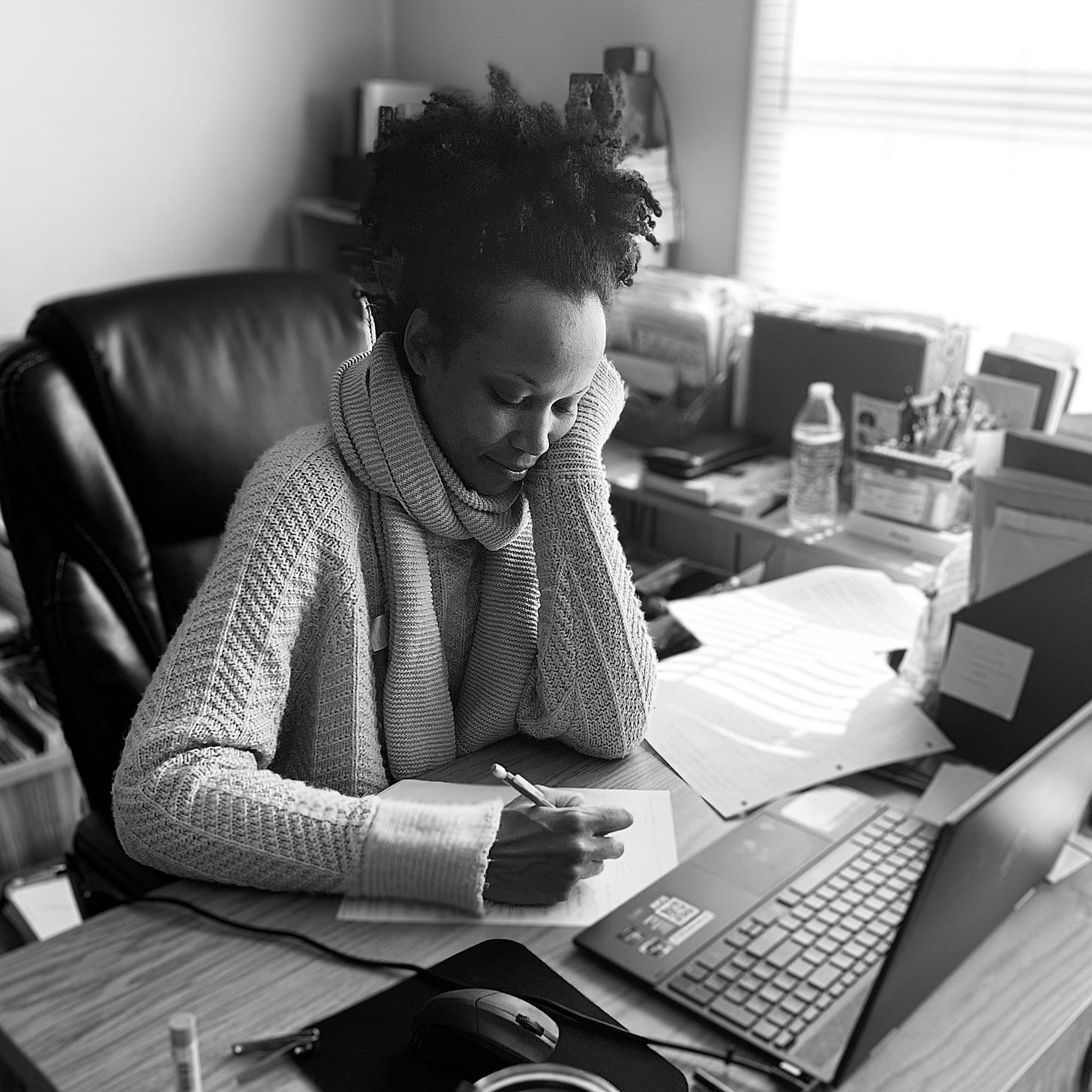reason #1: writing to witness
“The journal became a mirror that helped me know myself better.”
If you’re new here, paid subscribers receive story work exercises every Sunday night at 8 pm et. Story Work: Field Notes on Self-Discovery and Reclaiming Your Narrative is the name of my new book (which is currently available for preorder!) The term describes my signature process of reflecting, reclaiming, and reimagining the stories of our lives. It involves looking at your life experiences as creative material that you have the power to shape. For the next few weeks, our story work theme is Reasons for Writing. This post is temporarily available to all subscribers.
Before we get into today’s post, here’s some opportunities I have coming up for us to connect and write together:
July 27. Writing as a Restorative Practice via The Writer’s Center // 1 - 4 pm et
July 30. The Practice: Group Journaling Session #22 w/ Jacqueline Diaz // 5 - 6:30 pm et (open to paid subscribers)
August 3. Writing with Vulnerability and Creative Courage via
// 12 - 3 pm et
Self-Study. The Creative Courage Writing Intensive Self-Study // open until July 31
If you are interested in learning more about my workshops and coaching offerings, you can contact me or sign up here to receive notifications.
weekly story work exercise
Our theme for the next few weeks is Reasons for Writing. You can find other recent themes here. You can find all the archives here.
Writing isn’t a casual hobby for me, or even just a self-care habit. It’s a system I need to function. My journals and notebooks, both digital and analog, are like a second brain (such a helpful book!), helping me carry all the things I can’t possibly hold in my head alone.
I have a journal for stream-of-consciousness brain dumping like morning pages. One for planning my Story Work book and for all my other projects. A journal for the business course I’m taking. One for my manifestation journey. A system for daily, weekly, monthly, and annual reflection and planning. A financial freedom journal. And even one for cooking—not just recipes, but detailed, step-by-step notes to self, tips I’ve learned, and reminders like “don’t forget the pasta water” or “don’t take it out until it’s golden brown and the sauce bubbles, even if the time is up.”
My point is: I write everything down.
I remember once telling someone close to me that I couldn’t memorize the verbal instructions they were trying to give me and that I needed to write down each step.
They rolled their eyes and said, “You shouldn’t have to write everything down. You should be able to keep it in your head.”
And for a long time, I tried to operate that way. I was so used to believing that other people knew better than I did, and I didn’t trust myself. I felt inadequate for needing something different, like I was doing life wrong for not being able to carry it all mentally.
It seems like one day I just woke up and realized that I was giving all my power away... but of course it wasn’t all at once. It was little by little. Through study (this book was a gamechanger), experimentation, and honest self-witnessing…
I stopped asking:
What’s wrong with me? Am I doing this the “right” way? What will people think? Why does everything take me longer? Why can’t I be more like them?
Writing gave me access to new questions:
Is there another way to look at this? What are my actual needs? What helps me operate at my best? What assumptions am I making? What stories am I telling myself? What if I trusted myself more?
And these questions changed everything.
When we shift the questions we ask of ourselves, of others, of life—we also shift the insights, choices, and actions that follow.
Writing is how I understand myself. It’s how I unload my busy mind.
I know there is someone reading this right now who lives in their heads. Who loves to think and figure out and turn ideas over and over in their minds and come to conclusions. I get it. You are me and I am you.
But thinking alone is not enough. Thought needs to be partnered with supportive action, like writing or other forms of expression. To give our thoughts and visions shape and form so we can witness ourselves with clearer eyes and make meaning with a broader perspective.
Because we are not our thoughts.
That’s where writing to witness comes into play. Part of the magic of writing is that it creates distance without disconnection.
A healthy, curious kind of distance. One that is motivated by reverence and not avoidance. One that still keeps us close to ourselves, feeling safe enough to see what’s really there. Observing our thoughts, feelings, emotions, and circumstances with intimacy and without judgment.
Who doesn’t want intimacy without judgment? I know I certainly do.
When we write something down, we move it from the labyrinth of our minds to a form we can observe.
It allows us to look at the thought instead of from it. That shift means:
“I’m thinking this” becomes different from “This is true.”
“I feel worthless” becomes something we can question, instead of something we automatically believe.
You see?
Many of us—especially those with loud inner critics—need this shift more than we know.
We often underestimate how much we avoid this kind of intimacy with ourselves and all the different ways this shows up.
There are so many things we’d rather not think about, let alone write down and look at closely.
Like in my financial healing work: being able to sit down, look at my numbers honestly, and not flinch or look away? To be able to study my habits and decisions without beating myself up? This is a level of intimacy that I avoided for years. It’s a healthy detachment that I’ve had to learn. That I can separate my circumstances from my wholeness and worth.
Self-observation without judgment is an act of love.
Writing to witness invites us to become our own best friend, coach, therapist, accountability partner, interpreter, pattern spotter, secret admirer, cheerleader, and more. Whatever supportive role we need it to be. What else comes to mind for you?

Story Work begins with self-witnessing. Your story can’t change until it’s seen.
In Story Work, I explore how the stories we tell ourselves shape our lives, and the actions we can take to reclaim power over those narratives. I share the practices that have helped me witness my own experiences with clarity and compassion, uncover new meanings, and imagine new storylines.
These practices allow me to observe my thoughts and behaviors with gentle curiosity, revealing the deeper truths and values that live beneath them.
The story work exercises below invite you to reflect on writing as a tool for self-witnessing—an entry point into deeper awareness, growth, and creative clarity.
🌿If you’re craving a shift in your life and sense that writing could support you in navigating change or reconnecting with your creative voice, but you’re not sure where to begin or how to move forward:
🌿I’m creating a new 1:1 coaching offering just for this. It’s designed for individuals who want guidance in using writing as a practice for self-discovery and personal transformation. If this sounds like what you’ve been needing, you can learn more here and sign up to be the first to know when it’s live.
As you reflect on all of this, keep the following in mind:
Inner vision. Before healing, growth, and clarity can occur, we need to see ourselves—the dark, the light, the vibrant colors and shades of grey. The act of writing gives form and presence to parts of ourselves that may have been long dismissed, silenced, or overlooked.
Gentle distance. Writing to witness lets you observe your story with gentle distance, not disconnection, but with enough space to see clearly. This is especially powerful for people writing about trauma and difficult emotions and experiences.
No bad parts. (another book I recommend!) Witnessing without judgment reduces self-criticism and creates space for parts integration. Helping us stop fighting our emotions and start listening to what they have to say.
Safe in our skin. When we witness instead of reject our inner landscape, we begin to feel safer being fully ourselves. Writing becomes a refuge, a place where all parts of us are welcome. That safety leads to fuller expression and more resilience in all parts of our lives.
Writing to witness might look like:
Naming what you’re afraid to say out loud.
Honoring the younger version of yourself who didn’t have the words. Reclaiming memories that have felt blurred, hidden, or misrepresented.
Recording what you notice about your patterns, dreams, emotions, relationships, and experiences.
Describing your pain, joy, numbness, confusion, and the like, without needing to judge it as good or bad.
Okay, that’s plenty for this week. Let’s explore writing to witness through some exercises.
Exercise:
Self-Discovery
What in your life is asking to be witnessed? Not judged or fixed, but simply seen? For example, if you are experiencing resistance in your writing practice, you can write to witness that and describe it, without trying to judge it or fix it.
What parts of your story have gone unwitnessed? These could be moments that felt too small to matter, too painful to revisit, or too complex to explain, anything that hasn’t been fully explored or expressed. Make a list and let it serve as a story bank: each memory a writing prompt you can return to when you’re ready to offer those parts of yourself the presence and care they deserve.
Finish the following sentence and elaborate: If someone really knew me, they would see…
Storytelling
Describe a beginning, ending, turning point, or any meaningful moment in your life as if you were a witness standing quietly nearby. What would you notice? Tell the story in the third person, describing yourself as she, he, or they.









